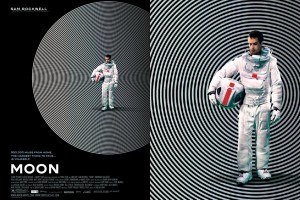 Every once in a while the process of working through a lot of cinema results in the finding of a gem that makes it all worth while. This is most certainly the case with MOON (2009), an independent science fiction film directed by Duncan Jones.
Every once in a while the process of working through a lot of cinema results in the finding of a gem that makes it all worth while. This is most certainly the case with MOON (2009), an independent science fiction film directed by Duncan Jones.
MOON is set in the unspecified near future where Helium-3 mined from the dark side of the moon provides much of the world’s energy supplies. Astronaut Sam Bell (played by Sam Rockwell) is the lone worker on the moon’s space station who is completing a three year tour of duty for a major corporation, Lunar Industries. Sam receives some assistance from a robot named GERTY (voiced by Kevin Spacey) who monitors his health, cooks his meals, and communicates with the corporation on earth. But while Sam is greatly looking forward to his soon return to earth, especially since a broken satellite has made live communication to his wife impossible, he begins to experience headaches, hallucinations, and eventually starts to question his own sanity. After a near-fatal accident in a lunar rover while checking on the Helium-3 harvester, Sam awakens with little memory of the event, and finds a duplicate of himself on the station with him. This scenario sets the stage for a gripping process of self-discovery for Sam.
MOON is a great piece of science fiction. Those used to the stereotypical conventions of the genre may be disappointed to find them missing here, but they are more than made up for with a moving dramatic performance by Rockwell, and a story with a bit of mystery to it where the viewer (along with Sam himself) is not sure initially whether Sam is losing his mind or some other more sinister scenario explains the strange occurrences on the lunar base. The film also includes a few interesting visuals, not of hi-tech special effects depicting space ships in battle, but rather through panoramic shots of the barren moon’s surface (space shots reminiscent of 2001) serving as the setting for the small rover and harvester, visually communicating and reinforcing the sense of loneliness experienced by Sam. Beyond the psychological angst explored in MOON the film also incorporates pressing contemporary issues, such as the need for a growing global energy supply, concerns over large corporations (particularly those associated with energy production), memory and identity, and ethical issues surrounding cloning.
MOON is an intelligent piece of science fiction (demonstrating again that the genre is suited to good storytelling and film making) that should have received greater screening presence in its release. Hopefully word will spread through reviewers now that the film is available on DVD which will result in greater exposure for this piece. In my view it is in a category that places it among the ranks of some of the best science fiction produced. At a time when some are wondering whether contemporary science fiction has surpassed horror, with films like MOON and District 9 it seems especially strong that this is indeed the case. If you’re a serious science fiction fan rent MOON , or better yet, purchase it and add it to your film collection.





The problem with smart films is they so rarely do well. But it WAS a very interesting film. Rockwell was great in it.